In this article we’re going to take a look at everything you need to know to plan an event.
If you’re interested in reaping some of the benefits of events for your business, let’s jump into this ultimate guide to event planning!
What is event planning?
Event planning is the process of organising and coordinating an event. There’s a lot of spinning plates involved, including choosing a venue, inviting attendees, creating a schedule, and more. Everything about an event – even down to transportation and post-event correspondence can be the responsibility of the event planner.
Event planning can be a difficult task but it’s also really rewarding to know you’ve created a memorable and enjoyable experience for attendees, plus hopefully generated some new business for your company!
Free event planning template
The template comes pre-populated with a comprehensive event planning checklist of ‘to-do’ type tasks for everything from booking venues to promoting your event, so you can tick off each step as you progress.
Plus, as with every project within Project.co, it’s completely customisable to your specific requirements!
The benefits of event planning
1. Increased brand visibility
Planning an event gives you the opportunity to increase brand visibility in a number of ways. For starters, if you host an event and connect with other brands in your industry (inviting them to come along), then you can immediately get on the radar of their customer base simply through your connection with them.
On top of that, a great event can create a memorable experience that can increase brand visibility even beyond the attendees through invaluable word-of-mouth marketing.
And in a virtual world, event planning gives you a distinct opportunity to make real connections with potential customers by meeting them face to face. This can not only increase brand visibility, but it can also do wonders for customer loyalty and, of course, business growth.
2. Networking opportunities
Events aren’t all about meeting customers, they’re also great places for networking too. When planning an event like a conference or trade show, you can work to bring professionals in your industry all under one roof.
This allows you to connect with like-minded individuals, build powerful connections, and maybe even form lucrative partnerships.
3. Increase sales
Increasing sales is probably one of the main goals of any event planner. Planning an event allows you to speak face-to-face with potential customers, generate leads, and create a buzz around your business.
The benefit of using event planning to increase sales over other methods is that you get a unique opportunity to speak directly to your target audience in real time. You can showcase your products, conduct live demonstrations, and answer any FAQs right there, in the flesh.
4. Build brand loyalty
Events allow existing and potential customers to peek behind the curtain and realise that your business isn’t just a logo or a website, but a group of people who are passionate about what they do. This opportunity to put a face to the name is a great way for customers to feel more connected to your brand.
And this connection is important, especially as more and more people are actively choosing to shop with small businesses over big, faceless corporations.
5. Gain a competitive advantage
Not all businesses host or plan events. By doing so, you can put your business ahead of the curve and establish yourself as a thought leader in your industry.
You can use events to launch new products and generate buzz around your brand. And you can also use events to gain a competitive advantage by gathering feedback from potential customers, addressing queries, and offering personalised experiences that people will remember for a long time!
6. Boost employee morale
Events are great for your customers and your business, but what about your employees?
Events actually double up as amazing team building exercises. By thrusting your employees into a fresh, new environment and encouraging them to work closely together to make things happen, you can boost morale and strengthen team relationships.
Events can also make employees feel more aligned with the success of the business, which can in turn increase productivity and employee retention.
7. Media coverage
Successful events can attract a lot of positive media attention and lead to invaluable press coverage and PR opportunities for your company.
If you find that your event doesn’t generate as much media coverage as you expected, at the very least you’ll end up generating tons of fresh, new and exciting content that you’ll be able to share on your social channels for months after the actual event has taken place.
How to plan an event: 8 steps
1. Define your objectives
The first step towards planning an event is figuring out why you want to have the event in the first place.
Ask yourself:
What do I want to achieve?
A couple of example objectives could be:
– To increase brand awareness by X%
– To increase sales by X%
– To raise X amount in donations for our cause
Basically, something that’s quantifiable and can be used after your event to help you determine whether it was a success or not.
2. Establish an event budget
Okay, so it’s not the most exciting part of event planning, but a key component of successful project management is determining your event budget.
So you’re probably going to need to get creative in order to allocate your resources wisely.
It can help to map out your event budget in advance. This way you’ll be able to make a list of what you need and determine what you can afford.
So, some of the key things to consider could include:
- A venue
- Promotion
- Entertainment/speakers
- Staff
- Food and drink
Using spreadsheet software, like Google Sheets can be a great way to keep track of your event budget. And the benefit with Google Sheets is that your team can collaborate on it together in real-time.
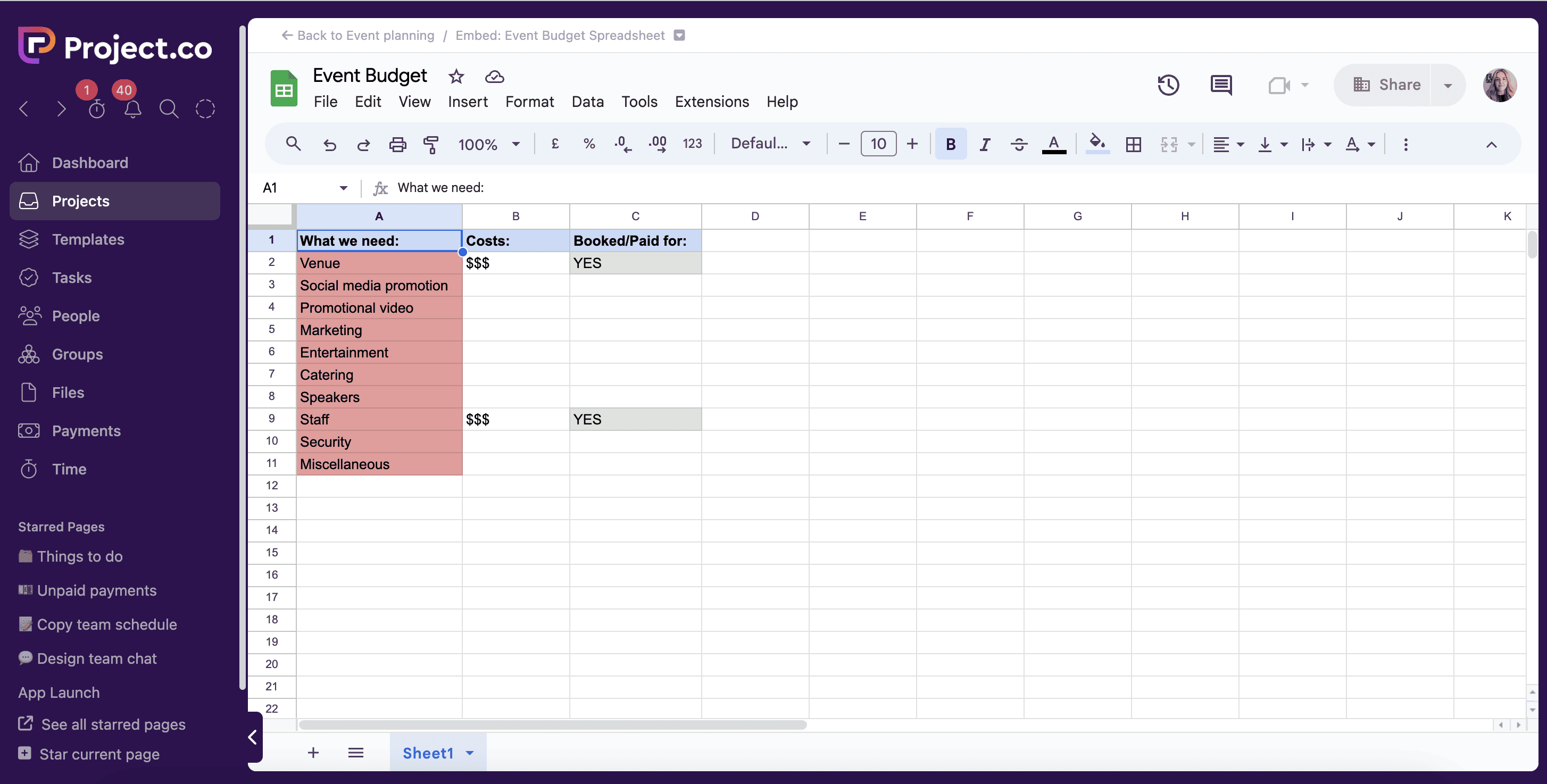
With the Project.co embeds tool, you can embed your Google Sheets directly to your project – meaning that everyone involved in the planning of the event can work on the document at the same time, without ever leaving the project! And this means you can keep your spreadsheets right next to your chat, tasks, files and more – all within each project.
3. Map out your schedule
With your objectives defined and your budget worked out, it’s time to map out your schedule. This encompasses everything you need to do between now and your event to make it happen.
One of the best ways to get started is to work backwards from your event date and plot out all of your tasks as a visual timeline.
After all, our brains are hardwired for visual information and can process visuals 60,000x faster than text!
The Project.co tasks feature is a great tool for mapping out your schedule, and our free events planning template actually comes pre-populated with customisable tasks – such as “Book Venue” and “Arrange Volunteers” – making it even easier to get started!
You can view your tasks in a couple of different ways, for example, as a list:
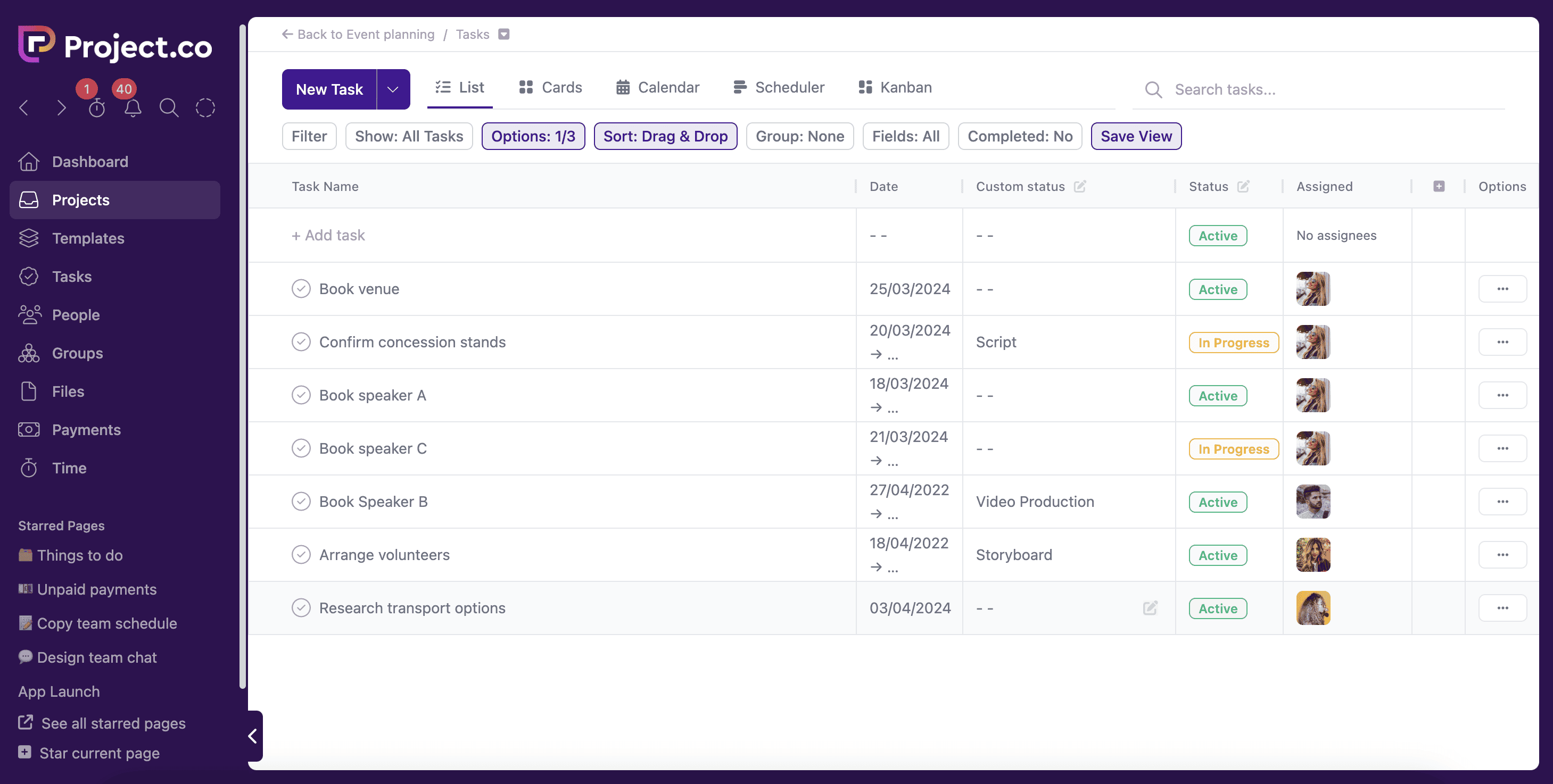
Or on a calendar:

And updating your timeline couldn’t be easier. All you need to do is drag and drop.
You can also split your tasks into groups using our kanban view:

This way, you can easily see what needs to be done, what you’re currently working on, and what has been completed.
You can also create new tasks in a couple of clicks and assign them to different members of your team:
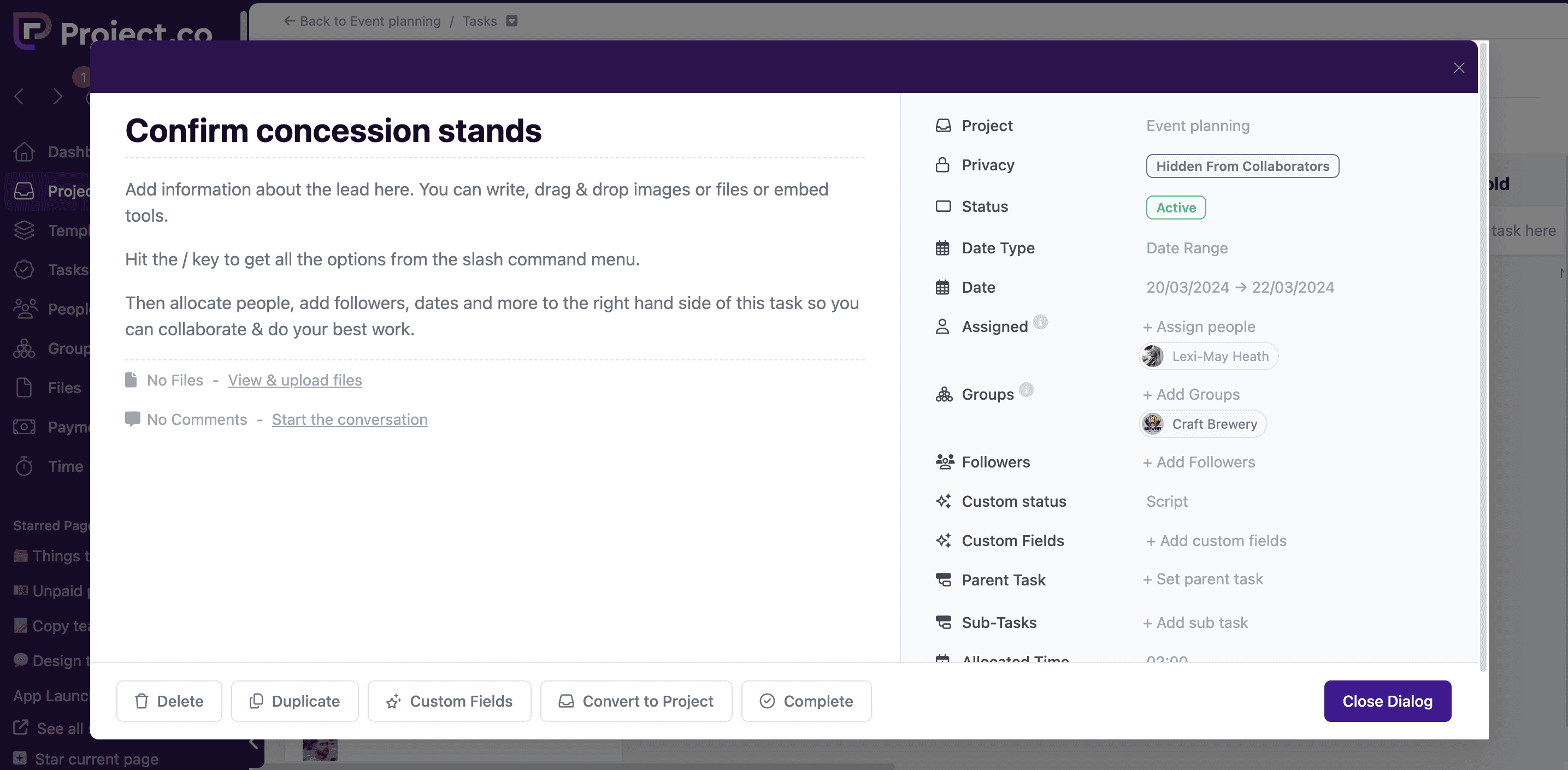
Having your schedule laid out in a concrete, visual task list is a great way to ensure you remain accountable and make progress towards your event planning.
4. Create an itinerary
Once you’ve booked your venue and you’ve set your date it’s time to create an itinerary for your event.
An itinerary is important for ensuring your event runs smoothly and is well scheduled. It can also help you to book speakers and exhibitors.
In addition, having an itinerary can help you to promote your event because you can share it with attendee to get them excited about what’s coming up!
But, as long as you have an idea of what your plans are for the day, weekend, or week – you’ll be better prepared to deal with any issues when the actual event is happening.
Within Project.co, you can attach files directly into the discussions tab so that everyone can download and view important documents, like your itinerary.
These files can also be viewed directly with Project.co before they are downloaded.
5. Organise the logistics
It’s important to consider all aspects of your event when planning, including the logistical things like transport, parking, and seating arrangements.
These are small but important details that, if missed, can cause real disruption for event attendees and send what would’ve been a well-organised event into a tailspin.
As you can open an unlimited number of projects within Project.co, you can manage each logistical aspect individually. And even allocate different things to different people so that you don’t become overwhelmed by all of the plates you need to spin.
Opening a new project from your dashboard is simple. Simply click the plus button next to Projects on the left-hand side:

Give your project a name, deadline, and a description (if applicable):

And then add your tools:
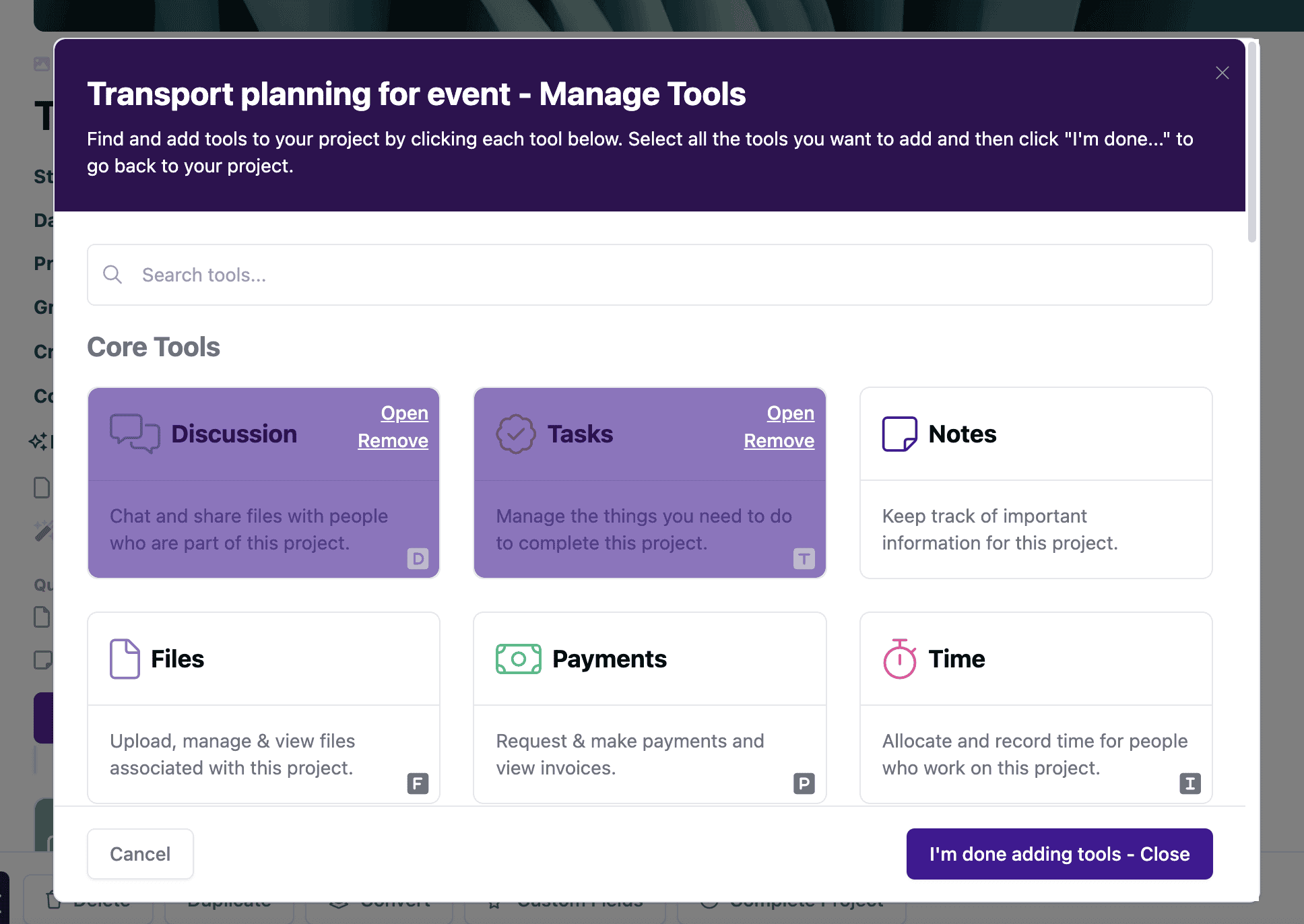
From there you can start using your project to manage whatever you like!
6. Book speakers
Booking speakers, exhibitors (and possibly sponsors) is crucial to the success of your event. By linking with related figures in your field you’ll be able to draw in a wider audience. And by partnering with sponsors – if applicable – you’ll be able to reduce some of the costs.
When booking speakers and exhibitors, it’s important to think about what your event attendees will want to see. What – or who – would excite them?
You could send out an open call for people to pitch themselves to you – and explain how they could bring value to your event. You could also consider contacting influencers in your industry directly.
The kanban tool within Project.co is a great way to keep track of these communications. You can move speakers down the funnel as your conversation progresses:
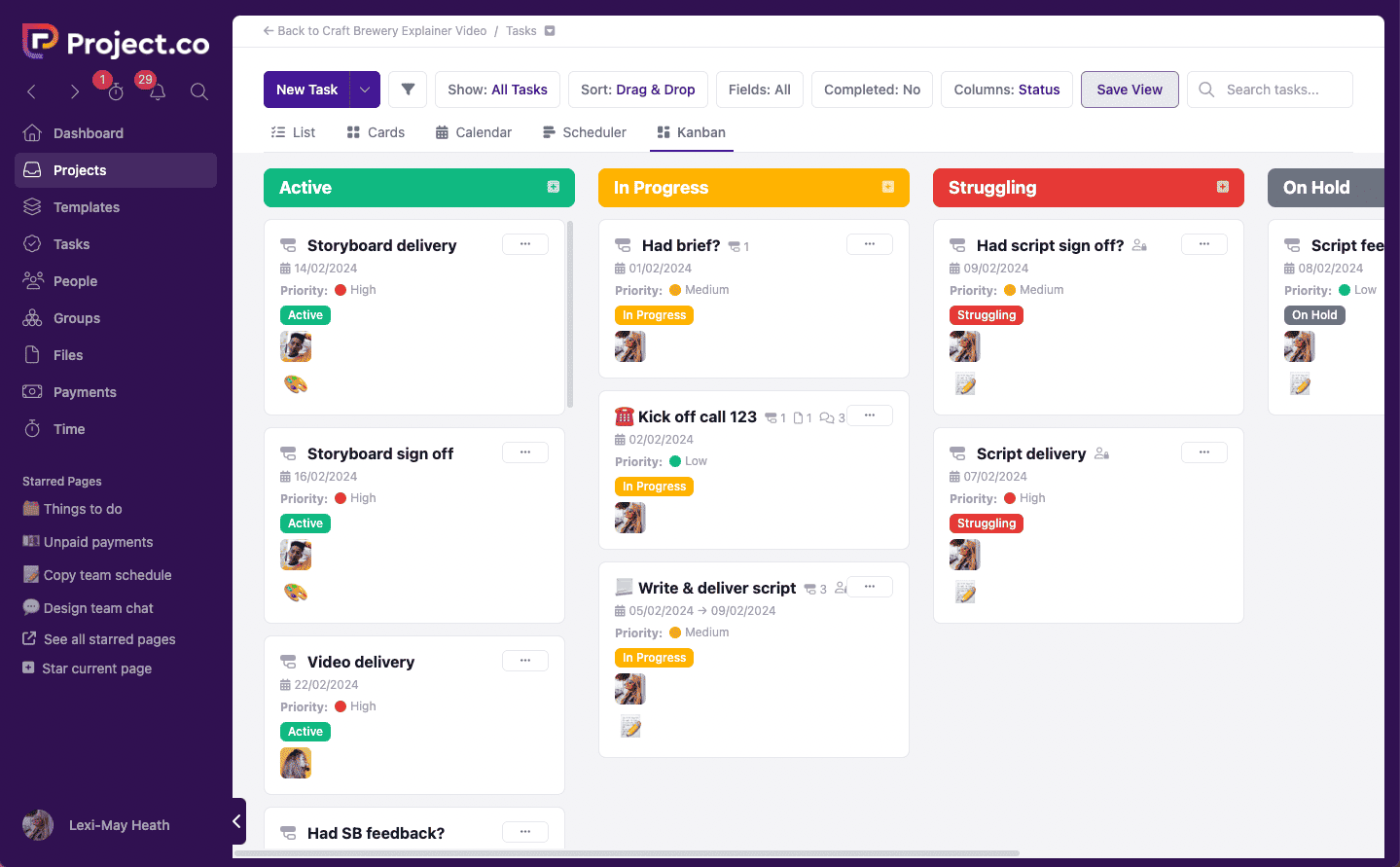
It’s easy to personalise your kanban columns to fit whatever need you have.
If your event is in-person it’s also important to contact vendors, such as security teams and caterers. After all, keeping your attendees fed and safe is just as crucial as entertaining them!
If the event is over a couple of nights, you could also contact local hotels and transportation services to see if you can strike a deal for your event attendees – adding even more value to your event.
7. Develop an event marketing strategy
This is possibly one of the most important steps of planning an event. After all, without a solid event marketing strategy, the right people won’t be able to find and attend your event.
It’s imperative that you develop an event marketing strategy that allows you to generate buzz and excitement for your event and reach people across all of the different channels where you usually communicate with your customers.
This is another thing that you can manage with a project management platform like Project.co. All you need to do is open a project, add your event marketing team, and set tasks for promoting your event in the months and weeks leading up to the big day!
8. Conduct a post-event review
After your event, it’s important to conduct a post-event review so that you can find out what worked and maybe what didn’t go exactly as you’d planned it. This can help you to understand what you’d do differently next time, and how your events can be more successful in the future.
But this shouldn’t be a doom and gloom operation! Definitely celebrate the things that went well too. And don’t forget to follow up and connect with the people you met on the day.
7 Event planning tips
1. Use a project management tool
If it isn’t clear by now, we think project management software is a great tool to have in your arsenal when it comes to event planning!
You have so many moving parts that consolidating everything in one secure place – from communication to files and payments – will make your life a lot easier.
2. Build a strong team
To plan a successful event, you need a strong team behind you. It’s important not to stretch yourself too thin and make sure you can delegate tasks to other diligent workers on your team so that all the different components of your event come together nicely.
3. Be realistic
It can be easy to get ahead of yourself when planning an event, but remember to stay focused on your goals and set realistic expectations for the day.
4. Have a plan B
It’s important to have a contingency plan in place for any unforeseen circumstances that could arise. For example, think about what you’d do if a speaker didn’t show up or if one of the event rooms was suddenly unavailable.
While scary, it’s important to consider all of these potential scenarios so that you can prepare for every eventuality and ensure there’s as little disruption as possible on the day.
5. Communicate frequently
Both before, during, and after the event, make sure you maintain consistent and open communication with everyone involved. This includes your internal team, any speakers, on-site event staff and, of course, your attendees.
6. DO sweat the small stuff
It’s a cliche, but the little things really do count. Consider the entire experience from your attendees’ point of view, especially when it comes to things like branding and signage. Think about what would make the event a positive and memorable experience for you, and try to emulate that.
Even something as small as giving everyone a free branded bottle of water as they enter is just enough to stick in the mind of event attendees and leave a long-lasting impression.
7. Stay calm!
There’s a lot of build up to an event, and it’s completely natural to feel stressed. But, if you can, try to remain calm and have fun on the day.
After all, up to that point you’ll have put so much effort into your plan that you should be able to have faith in it and just be present in the moment.
Final thoughts
Planning an event is a huge undertaking. There is so much to think about and if you let yourself become overwhelmed then small errors can snowball into huge mistakes.
But when you pull off an amazing event it feels so rewarding! And hopefully your business will reap the benefits, too.
With our events template by your side you’ll be equipped to create an amazing event – without the stress!


